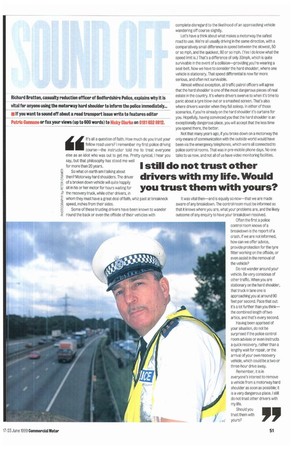Richard Bratton, casualty reduction officer of Bedfordshire Police, explains why
Page 53

If you've noticed an error in this article please click here to report it so we can fix it.
it is _ vital for anyone using the motorway hard shoulder to inform the police immediately...
I If you want to sound off about a road transport issue write to features editor Patric CUIlliall0 or fax your views (up to 600 words) to Bldg Marko on 0181652 8912.
d It's all a question of faith. How much do you trust your
fellow road users? I remember my first police driving course—the instructor told me to treat everyone else as an idiot who was out to get me. Pretty cynical, I hear you say, but that philosophy has stood me well for more than 20 years.
E5 So what on earth am I talking about 2
cl then? Motorway hard shoulders. The driver ,..,
EF, of a broken down vehicle will quite happily s.,. sit in his or her motor for hours waiting for E the recovery truck, while other drivers, in E. whom they must have a great deal of faith, whiz past at breakneck ‹ 5 speed, inches from their sides.
• Some of these trusting drivers have been known to wander c) i round the back or even the offside of their vehicles with complete disregard to the likelihood of an approaching vehicle wandering off course slightly.
Let's have a think about what makes a motorway the safest road to use. We're all usually driving in the same direction, with a comparatively small difference in speed between the slowest, 50 or so mph, and the quickest, 80 or so mph. (Yes I do know what the speed limit is.) That's a difference of only 30mph, which is quite survivable in the event of a collision--providing you're wearing a seat-belt. Now we have to consider the hard shoulder, where one vehicle is stationary. That speed differential is now far more serious, and often not survivable.
Almost without exception, all traffic patrol officers will agree that the hard shoulder is one of the most dangerous pieces of real estate in the country. It's where drivers swerve to when it's time to panic about a tyre blow-out or a smashed screen. That's also where drivers wander when they fall asleep. In either of those scenarios, if you're already on the hard shoulder it's curtains for you. Hopefully, having convinced you that the hard shoulder is an exceptionally dangerous place, you will accept that the less time you spend there, the better.
Not that many years ago, if you broke down on a motorway the only means of communication with the outside world would have been via the emergency telephones, which were all connected to police control rooms. That was in pre-mobile phone days. No one talks to us now, and not all of us have video monitoring facilities.
It was vital then—and is equally so now—that we are made aware of any breakdown. The control room must be informed so that it knows where you are, what your problems are, and the likely outcome of any enquiry to have your breakdown resolved.
Often the first a police control room knows of a breakdown is the report of a crash. If we are not informed, how can we offer advice, provide protection for the tyre fitter working on the offside, or even assist in the removal of the vehicle?
Do not wander around your vehicle. Be very conscious of other traffic. When you are stationary on the hard shoulder, that truck in lane one is approaching you at around 90 feet per second. Pace that out: it's a lot further than you think— the combined length of two artics, and that's every second.
Having been apprised of your situation, do not be surprised if the police control room advises or even instructs a quick recovery, rather than a lengthy wait for repair, or the arrival of your own recovery vehicle, which could be a two or three-hour drive away.
Remember, it is in everyone's interest to remove a vehicle from a motorway hard shoulder as soon as possible; it is a very dangerous place. I still do not trust other drivers with my life.
Should you trust them with
lop
















































































































